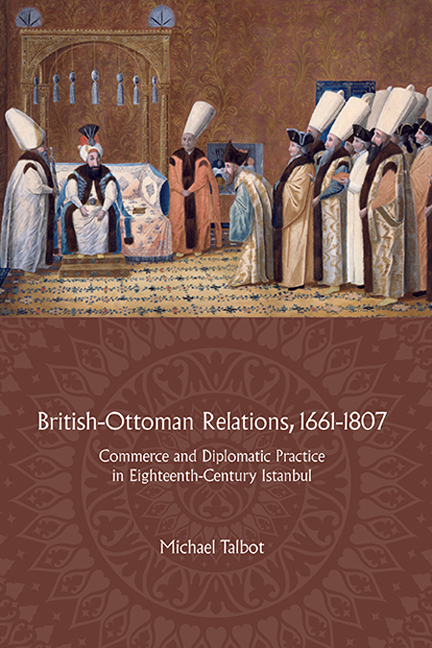 British-Ottoman Relations, 1661-1807
British-Ottoman Relations, 1661-1807 Book contents
- Frontmatter
- Dedication
- Contents
- List of tables and figures
- Acknowledgements
- Note on languages, place names, dates, and currencies
- List of abbreviations
- Introduction: De/re-constructing the history of British–Ottoman relations
- 1 The framework of relations
- 2 The office of ambassador
- 3 Trade and diplomatic finances
- 4 Gift-giving
- 5 Diplomacy as performance
- 6 Negotiating disputes
- Conclusions: De/re-constructing British–Ottoman diplomacy
- Bibliography
- Index
6 - Negotiating disputes
Published online by Cambridge University Press: 29 July 2017
- Frontmatter
- Dedication
- Contents
- List of tables and figures
- Acknowledgements
- Note on languages, place names, dates, and currencies
- List of abbreviations
- Introduction: De/re-constructing the history of British–Ottoman relations
- 1 The framework of relations
- 2 The office of ambassador
- 3 Trade and diplomatic finances
- 4 Gift-giving
- 5 Diplomacy as performance
- 6 Negotiating disputes
- Conclusions: De/re-constructing British–Ottoman diplomacy
- Bibliography
- Index
Summary
Freedoms, debts, and violence: Consular functions and diplomatic notes
In the late summer of 1764, a violent brawl erupted at a tavern in London, caused initially by a disagreement between two seamen. The pub was gutted, with all the furniture smashed and all the food and drink ransacked; the owner lost everything. The landlord of that particular establishment happened to be an Ottoman subject from Athens, who is recorded in the petitionary records as Thomas Berzuoni. This Berzuoni was a merchant who went to London to trade but, due to a great decrease in commerce during the Seven Years’ War, had instead invested his money into renting a pub to earn some cash whilst waiting for business to pick up again. Just before his six-month's lease was over, and just before he was to sail for Istanbul to return home, this violent event ruined his investment and left him with nothing. He tried to gain some sort of redress from British courts and judicial and political authorities, but to no avail. Destitute and desperate, his wife wrote to Henry Grenville, the ambassador in Istanbul, to see if he could put some pressure on the authorities in London to help Berzuoni. Few of these sorts of cases are recorded, but when they are, it is evident that the lack of Ottoman diplomatic or consular representation in Britain made it very difficult for Ottoman subjects involved in any kind of dispute to find justice, and usually resulted in pressure being applied on their behalf via the ambassador in Istanbul. A key duty of the British ambassador was to represent the interests of merchants with the Ottoman government, particularly commercial disputes and other sorts of litigation. Poor Berzuoni, however, was thirty years too early for an Ottoman ambassador in London to be able to provide him with similar assistance.
The majority of the British ambassador's time was spent intervening in commercial disputes between British and Ottoman subjects. The major diplomatic disputes that occurred centred on daily commercial disputes on the one hand and the resolving compensation claims of Ottoman subjects wronged by British privateers on the other. As we shall see, the implementation of British foreign policy, the high diplomacy of traditional historiography, played only a minor role, except when, as the eighteenth century wore on, that foreign policy resulted in violence against Ottoman shipping.
- Type
- Chapter
- Information
- British-Ottoman Relations, 1661-1807Commerce and Diplomatic Practice in Eighteenth-Century Istanbul, pp. 173 - 210Publisher: Boydell & BrewerPrint publication year: 2017
